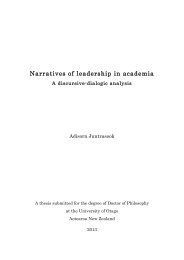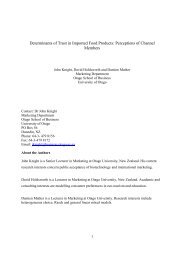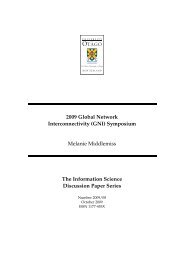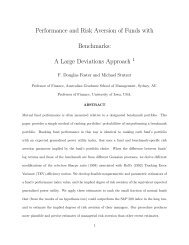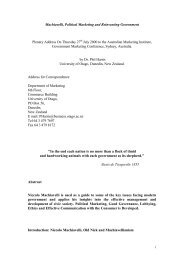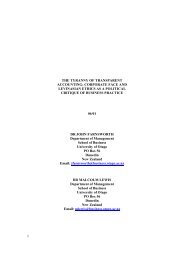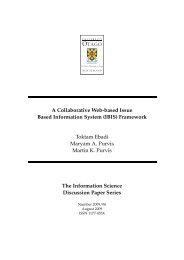Where is R2P grounded in international law? Anne-Marie Judson A ...
Where is R2P grounded in international law? Anne-Marie Judson A ...
Where is R2P grounded in international law? Anne-Marie Judson A ...
You also want an ePaper? Increase the reach of your titles
YUMPU automatically turns print PDFs into web optimized ePapers that Google loves.
INTRODUCTION – Treaties are not empty gestures states have obligations <strong>in</strong> <strong>in</strong>ternational <strong>law</strong>.<br />
PRINCIPAL RESEARCH FINDINGS<br />
The pr<strong>in</strong>cipal f<strong>in</strong>d<strong>in</strong>gs of th<strong>is</strong> research show that states are subject to <strong>in</strong>ternational<br />
customary <strong>law</strong>. They are dependent on their bilateral and multilateral relationships <strong>in</strong><br />
contract and their sovereignty <strong>is</strong> subject to their compliance with <strong>in</strong>ternational <strong>law</strong>.<br />
State legitimacy <strong>is</strong> found to be dependent on state actions, which <strong>in</strong>clude its<br />
responsibility to prevent and to protect its citizens from harm.<br />
Treaties are not empty gestures: they are agreements that b<strong>in</strong>d the state to duties,<br />
obligations and responsibilities <strong>in</strong> <strong>in</strong>ternational <strong>law</strong>. States are restra<strong>in</strong>ed <strong>in</strong> their<br />
affairs and their objectives by their obligations to protect and prevent breaches and<br />
violations. These obligations <strong>in</strong>clude implement<strong>in</strong>g the treaties, statutes and<br />
conventions they are a party to, <strong>in</strong>to their local jur<strong>is</strong>diction, local education and<br />
military programmes. These agreements that they choose to make, conta<strong>in</strong> prevention<br />
applications and they <strong>in</strong>clude obligatory non-d<strong>is</strong>crim<strong>in</strong>ation rights. The practices that<br />
the state must not engage <strong>in</strong> <strong>in</strong>clude genocide and war crimes, Crimes aga<strong>in</strong>st<br />
humanity are non-derogatory as they amount to breaches of <strong>in</strong>ternational peace and<br />
security. The Security Council can implement resolutions to enforce compliance with<br />
these <strong>in</strong>ternational <strong>law</strong>s and norms to <strong>in</strong>tervene <strong>in</strong> a state where rights are be<strong>in</strong>g<br />
abused and <strong>in</strong>ternational <strong>law</strong> <strong>is</strong> be<strong>in</strong>g violated.<br />
These rules of <strong>law</strong> have not changed. The responsibilities of states are not new ideas<br />
or practices but are firmly <strong>grounded</strong> <strong>in</strong> <strong>in</strong>ternational <strong>law</strong>, both <strong>in</strong> application and <strong>in</strong><br />
pr<strong>in</strong>ciple. Th<strong>is</strong> research helps to clarify that states have responsibilities <strong>in</strong> <strong>in</strong>ternational<br />
<strong>law</strong> to refra<strong>in</strong> from committ<strong>in</strong>g atrocities. These obligations extend to supply<strong>in</strong>g the<br />
Security Council with the means necessary to conduct and complete the application to<br />
restra<strong>in</strong> a state <strong>in</strong> violation of their duties. These are not just responsibilities: the state<br />
<strong>is</strong> bound to act <strong>in</strong> a manner cons<strong>is</strong>tent with <strong>in</strong>ternational <strong>law</strong> as a party to the United<br />
Nations Charter and the Statute of the International Court of Justice (1945). These<br />
obligations are well documented and the Security Council has shown its will<strong>in</strong>gness to<br />
follow through, to prevent abuse and protect these duties <strong>in</strong> <strong>in</strong>ternational <strong>law</strong>. Th<strong>is</strong><br />
research shows how the Responsibility to Protect (<strong>R2P</strong>) doctr<strong>in</strong>e adds noth<strong>in</strong>g new to<br />
these duties and obligations. It provides a declaration to rem<strong>in</strong>d states of these duties.<br />
<strong>R2P</strong> cannot enforce these duties because it <strong>is</strong> not <strong>in</strong>ternational <strong>law</strong> <strong>in</strong> its own right, It<br />
<br />
7



